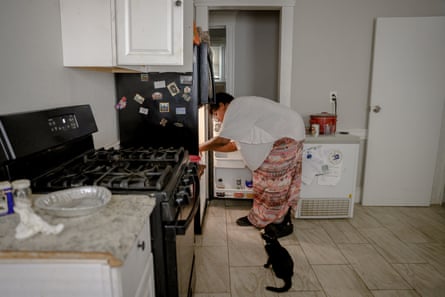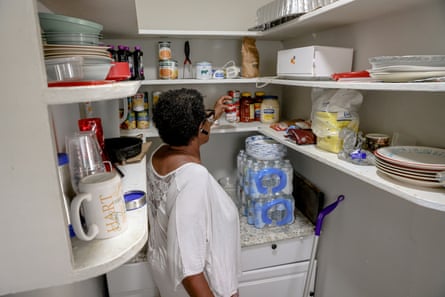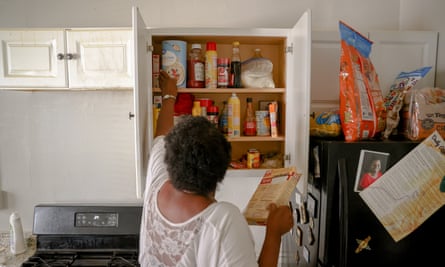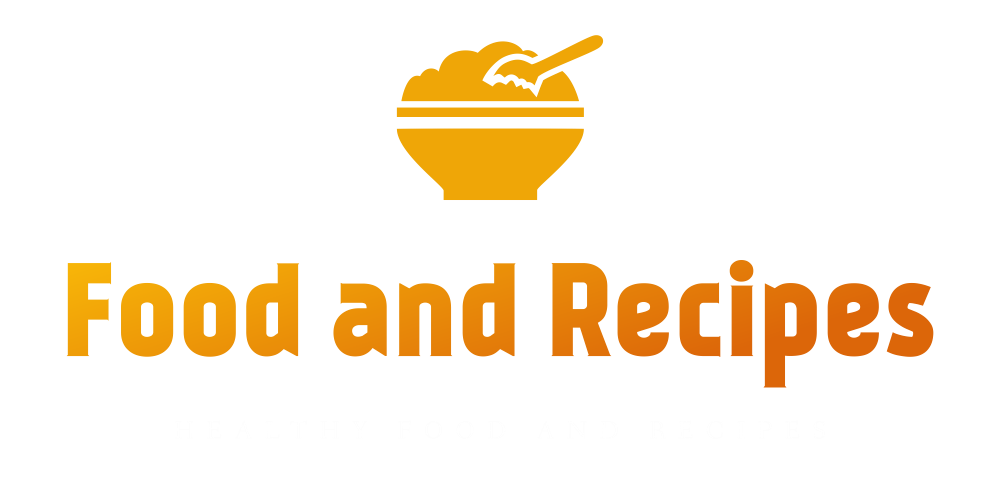‘I felt like I failed’: inflation puts healthy food out of reach for millions of Americans | US news
In April, Kimberly Hart made a resolution to lose some weight on the advice of her doctor. Hart, who is 61 and lives in New Haven, Connecticut, has high blood pressure and cholesterol. These factors, combined with her age and weight, put her at an elevated risk for developing diabetes, and she wanted to do whatever she could to prevent that from happening.
One element within her control, Hart thought at the time, was her diet. She started seeing a nutritionist, a cost covered by Medicaid, and eating more healthily. But it wasn’t long before her efforts clashed with the reality of rising grocery costs.
In May, Hart began to really feel the pinch of higher prices, and by June, she realized she had to completely upend the way she put food on the table for her and her son.

She swapped wheat bread for store-brand white bread, “which is too bad” she said, “because I know that wheat bread is healthier for me, but I also know that white bread is cheaper”. She switched from frozen vegetables to cheaper canned ones, despite lower nutritional value and higher sodium content, and no longer buys fresh fruit. Four months since her April resolution, she said, the scale hasn’t budged.
“The more color a plate has the healthier it is, because you get your color from fresh vegetables,” she said. But because of her financial situation, “I can’t really do that”.
Inflation is pushing healthy eating out of reach for millions of people like Hart, a trend that public health experts worry could increase their risk for diet-related diseases in the long run. Over the past year, grocery prices have risen rapidly as agricultural supply chains bowed under the pressure of food scarcity, labor shortages and high fuel costs.
By the end of July, the cost of eating food at home had increased by more than 13{d2b09b03d44633acb673e8080360919f91e60962656af8ade0305d5d8b7e4889} compared to the same period a year ago, according to the Consumer Price Index. According to a survey conducted by the Urban Institute in June and July, more than 20{d2b09b03d44633acb673e8080360919f91e60962656af8ade0305d5d8b7e4889} of adults reported experiencing food insecurity within the past 30 days, an increase of more than 6{d2b09b03d44633acb673e8080360919f91e60962656af8ade0305d5d8b7e4889} from spring of last year.
It might seem counterintuitive but scientists have long pointed to links between poverty and obesity. This week, the Biden administration launched a national strategy to tackle the country’s “urgent, nutrition-related health crisis”, including the “rising prevalence” of diet-related diseases such as obesity.
In response to higher prices, people are buying cheaper, processed foods high in calories, sugar and sodium over costlier options like fruits and vegetables, protein and whole grains, according to public health researchers and anti-hunger experts.
“Highly processed foods are still the most affordable for people and they can stretch longer and they have a longer shelf life,” said Mariana Chilton, professor and director of the Center for Hunger-Free Communities at Drexel University. “People want to buy healthy food, but then they make the choice to get food that is not as healthy but that stays on the shelf longer and can stretch and helps their kids feel fuller.”

Over the long term, researchers have found that food insecurity – defined by the Department of Agriculture as uncertain access to nutritionally adequate food – is probably associated with obesity, a condition that in turn raises the risk of problems including diabetes, heart disease and strokes.
“People in the United States who are more food insecure have higher rates of overweight and obesity,” said Parke Wilde, a professor of food and nutrition policy at Tufts University. Wilde added that low-income people without access to social safety programs are most harmed by inflation-driven food insecurity, and its associated health risks.
While researchers have investigated the link between food insecurity and obesity for decades, exactly how the two issues are related remains unsettled, Wilde said. One explanation may be in the uncertainty it brings. “Having a boom-and-bust cycle in how much food you have might have sends a signal to your body that it needs to retain food energy, and that might put people at higher risk of overweight and obesity,” Wilde said.
Anti-hunger advocates say that food insecurity driven by inflation illustrates the powerful role that poverty plays in shaping dietary choices and healthy eating, which have historically been framed as a matter of individual decision-making.
“There’s this sense that low-income people don’t know how to eat,” said Thomas Reynolds, the chief executive officer of Northwest Harvest, a network of 300 food banks in Washington state. “I just totally reject that. It’s really about just making very practical decisions, because money is so tight right now.”

Katrena Ross, 40, a legal assistant and mother of three living in Redford, Michigan, first started worrying about inflation in February. At the time, Ross was already straining to feed her family on a monthly budget of less than $200, a situation that made her especially attuned to even the slightest price increase.
As prices began to rise in the spring, Ross couldn’t afford to buy as much fresh produce and meat. Instead she reached for peanut butter and jelly, pasta, boxed macaroni and cheese and $1 ramen noodles – a food she hadn’t purchased in years.
“I would love to say that I think about what eating like this would do to me and my kids but that’s not really a luxury that I have, because I can only think about: what am I feeding them now? What do I have to make sure that they don’t go to bed hungry?”
Public health experts emphasize that food insecurity takes more than just a physical toll – it can also have harmful psychological impacts.
“A lot of people just think about obesity, diabetes, metabolic syndrome, heart disease and yes, all of those can get exacerbated, but a lot of people tend to forget about the emotional consequences,” said Chilton of Drexel University.
Eventually, Ross made the decision to move her family back home with her mother and stepfather, a move that allowed the merged household to pool resources and shoulder the burden of inflation together. It’s a choice that also gave her a much-needed peace of mind.
“My ability to not provide the basics for my family like food and keeping a roof … that was destroying my mental health,” Ross said. “I felt like I had failed them. I felt like I couldn’t keep them safe or provide for them properly, which for a mom or for any parent really, it really hits your self-worth.”
Reynolds of Northwest Hunger said that there are numerous ways that lawmakers can strengthen the social safety net in order to prevent families like Ross’s from experiencing food insecurity in the first place, as well as help them cope with the unexpected costs of rapid inflation.
“Poverty and hunger are so closely related, it’s almost interchangeable,” he said. He believes policies such as universal basic income, free school meals and higher payments to people in the Supplemental Nutrition Assistance Program (Snap, formerly known as food stamps) could bolster food security and make healthy eating more affordable.

For Hart, more generous Snap payments could make a significant difference to her life. Before the pandemic, she estimates she received around $400 a month from the program. But her 20-year-old son recently got a part-time job and the additional income caused their household benefits to drop. Her son is now considering taking a higher-paying position, something that she supports, but she worries that will lead to even further cuts in their monthly Snap allotment.
“It’s a catch-22,” she said. These days, she organizes her week around waiting in lines for food pantries, which she relies on for extra produce, dairy and meat.
Hart said she feels demoralized that she hasn’t lost any weight since April. Sometimes, she lies to her nutritionist about following a healthier diet, just to sidestep the fact that she can’t actually afford it. “One day, I might wake up diabetic,” said Hart. “If I could just eat healthier … but I can’t.”
